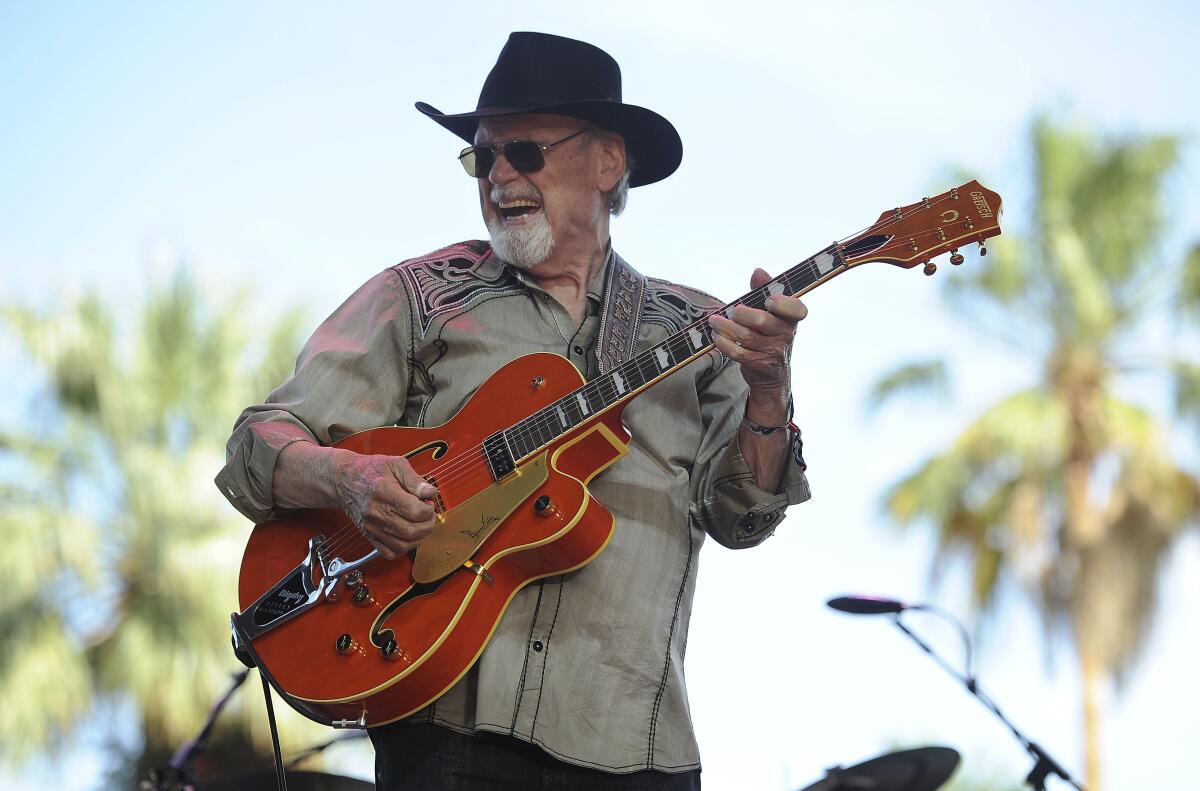Duane Eddy, rock guitarist known for ‘Rebel Rouser,’ ‘Peter Gunn’ and ‘twang,’ dies at 86

NEW YORK — Duane Eddy, a pioneering guitar hero whose reverberating electric sound on instrumentals such as “Rebel Rouser” and “Peter Gunn” helped put the twang in early rock ’n’ roll and influenced George Harrison, Bruce Springsteen and countless other musicians, has died. He was 86.
Eddy died of cancer Tuesday at the Williamson Health hospital in Franklin, Tenn., according to his wife, Deed Abbate.
With his raucous rhythms, and backing hollers and hand claps, Eddy sold more than 100 million records and mastered a distinctive sound based on the premise that a guitar’s bass strings sounded better on tape than the high ones.
What a difference a human makes.
“I had a distinctive sound that people could recognize and I stuck pretty much with that. I’m not one of the best technical players by any means; I just sell the best,” he told the Associated Press in a 1986 interview. “A lot of guys are more skillful than I am with the guitar. A lot of it is over my head. But some of it is not what I want to hear out of the guitar.”
“Twang” defined Eddy’s sound from his first album, “Have Twangy Guitar Will Travel,” to his 1993 box set, “Twang Thang: The Duane Eddy Anthology.”
“It’s a silly name for a nonsilly thing,” Eddy told the AP in 1993. “But it has haunted me for 35 years now, so it’s almost like sentimental value — if nothing else.”
He was inducted into the Rock and Roll Hall of Fame in 1994.
Duane Eddy was recently asked in a television interview about his being nominated again for the Rock and Roll Hall of Fame.
Eddy and producer Lee Hazlewood helped create the “Twang” sound in the 1950s, a sound Hazlewood later adapted for his production of Nancy Sinatra’s 1960s smash “These Boots Are Made for Walkin’.”
Eddy had a commercial peak from 1958 to 1963. He said in 1993 that he took his 1970 hit “Freight Train” as a clue to slow down.
“It was an easy-listening hit,” he recalled. “Six or seven years before, I was on the cutting edge.”
Eddy had more than 50 albums, some of them reissues. He did not work much from the 1980s on, “living off my royalties,” he said in 1986.
About “Rebel Rouser,” he told the AP: “It was a good title and it was the rockest rock ’n’ roll sound. It was different for the time.”
Eddy scored theme music for movies including “Because They’re Young,” “Pepe” and “Gidget Goes Hawaiian.” But he said he turned down doing the James Bond theme song because there wasn’t enough guitar music in it.
Guitarists Duane Eddy and Link Wray earned places in rock history in the late ‘50s with instrumental hits that were as exciting to a generation of rock fans as anything by singers Buddy Holly or Little Richard.
In the 1970s, he worked behind the scenes in music production work, mainly in Los Angeles.
Eddy was born in Corning, N.Y., and grew up in Phoenix, where he began playing guitar at 5. He spent his teens in Arizona dreaming of singing on the Grand Ole Opry and eventually signed with Jamie Records of Philadelphia in 1958. “Rebel Rouser” soon followed.
Eddy later toured with Dick Clark’s “Caravan of Stars” and appeared in “Because They’re Young” and “Thunder of Drums,” among other movies.
He moved to Nashville in 1985 after years of semiretirement in Lake Tahoe.
Eddy was not a vocalist, saying in 1986, “One of my biggest contributions to the music business is not singing.”
Paul McCartney and George Harrison were both fans of Eddy, and he recorded with them after their Beatles days. He played on McCartney’s “Rockestra Theme” and Harrison played on Eddy’s self-titled comeback album, both in 1987.
More to Read
The biggest entertainment stories
Get our big stories about Hollywood, film, television, music, arts, culture and more right in your inbox as soon as they publish.
You may occasionally receive promotional content from the Los Angeles Times.








